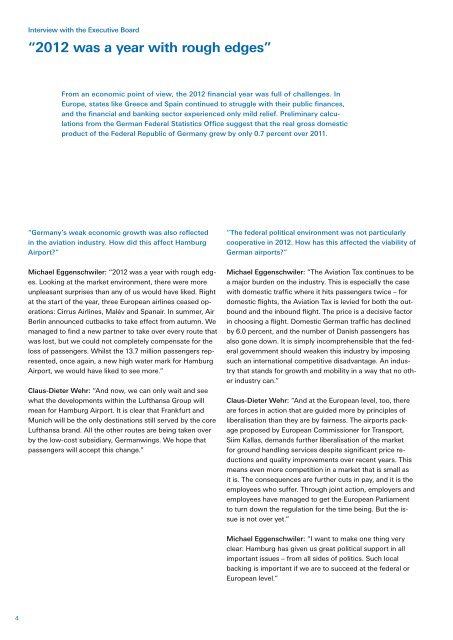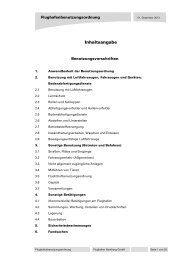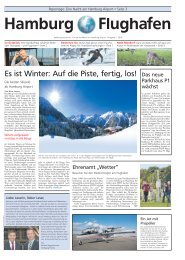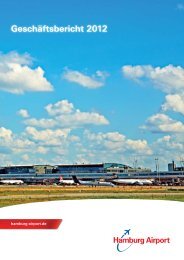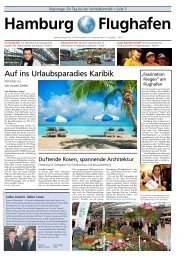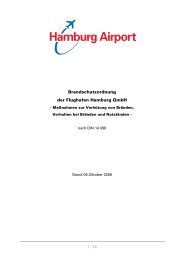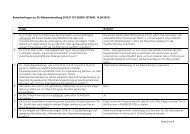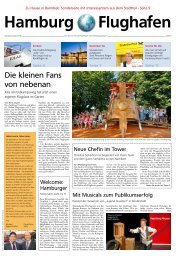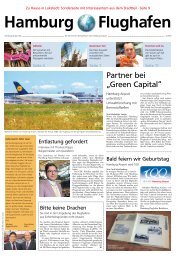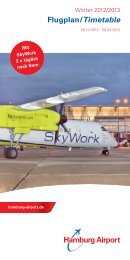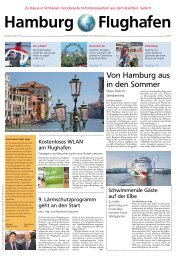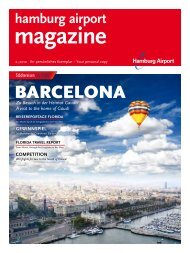Annual Report 2012 (PDF) - Hamburg
Annual Report 2012 (PDF) - Hamburg
Annual Report 2012 (PDF) - Hamburg
You also want an ePaper? Increase the reach of your titles
YUMPU automatically turns print PDFs into web optimized ePapers that Google loves.
Interview with the Executive Board<br />
“<strong>2012</strong> was a year with rough edges”<br />
From an economic point of view, the <strong>2012</strong> financial year was full of challenges. In<br />
Europe, states like Greece and Spain continued to struggle with their public finances,<br />
and the financial and banking sector experienced only mild relief. Preliminary calculations<br />
from the German Federal Statistics Office suggest that the real gross domestic<br />
product of the Federal Republic of Germany grew by only 0.7 percent over 2011.<br />
“Germany’s weak economic growth was also reflected<br />
in the aviation industry. How did this affect <strong>Hamburg</strong><br />
Airport?”<br />
Michael Eggenschwiler: “<strong>2012</strong> was a year with rough edges.<br />
Looking at the market environment, there were more<br />
unpleasant surprises than any of us would have liked. Right<br />
at the start of the year, three European airlines ceased operations:<br />
Cirrus Airlines, Malév and Spanair. In summer, Air<br />
Berlin announced cutbacks to take effect from autumn. We<br />
managed to find a new partner to take over every route that<br />
was lost, but we could not completely compensate for the<br />
loss of passengers. Whilst the 13.7 million passengers represented,<br />
once again, a new high water mark for <strong>Hamburg</strong><br />
Airport, we would have liked to see more.”<br />
Claus-Dieter Wehr: “And now, we can only wait and see<br />
what the developments within the Lufthansa Group will<br />
mean for <strong>Hamburg</strong> Airport. It is clear that Frankfurt and<br />
Munich will be the only destinations still served by the core<br />
Lufthansa brand. All the other routes are being taken over<br />
by the low-cost subsidiary, Germanwings. We hope that<br />
passengers will accept this change.”<br />
“The federal political environment was not particularly<br />
cooperative in <strong>2012</strong>. How has this affected the viability of<br />
German airports?”<br />
Michael Eggenschwiler: “The Aviation Tax continues to be<br />
a major burden on the industry. This is especially the case<br />
with domestic traffic where it hits passengers twice – for<br />
domestic flights, the Aviation Tax is levied for both the outbound<br />
and the inbound flight. The price is a decisive factor<br />
in choosing a flight. Domestic German traffic has declined<br />
by 6.0 percent, and the number of Danish passengers has<br />
also gone down. It is simply incomprehensible that the federal<br />
government should weaken this industry by imposing<br />
such an international competitive disadvantage. An industry<br />
that stands for growth and mobility in a way that no other<br />
industry can.”<br />
Claus-Dieter Wehr: “And at the European level, too, there<br />
are forces in action that are guided more by principles of<br />
liberalisation than they are by fairness. The airports package<br />
proposed by European Commissioner for Transport,<br />
Siim Kallas, demands further liberalisation of the market<br />
for ground handling services despite significant price reductions<br />
and quality improvements over recent years. This<br />
means even more competition in a market that is small as<br />
it is. The consequences are further cuts in pay, and it is the<br />
employees who suffer. Through joint action, employers and<br />
employees have managed to get the European Parliament<br />
to turn down the regulation for the time being. But the issue<br />
is not over yet.”<br />
Michael Eggenschwiler: “I want to make one thing very<br />
clear: <strong>Hamburg</strong> has given us great political support in all<br />
important issues – from all sides of politics. Such local<br />
backing is important if we are to succeed at the federal or<br />
European level.”<br />
4


